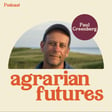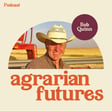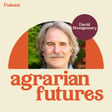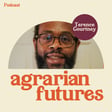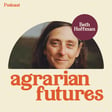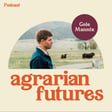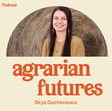
How Big Food Stole Organic, and the Fight to Reclaim It with Dave Chapman
In the 1990s, the success of the US organic movement seemed undeniable. Demand for healthy, chemical-free produce skyrocketed amidst public health concerns and a growing environmental consciousness. As a consequence, many small organic farmers could make a real living selling healthy produce and restoring farmland in the process.
In the decades since, however, the story has gotten much more complicated.
Corporate co-optation, lax government oversight, and splinters within the movement itself have created a new set of challenges for organic farmers and activists - challenges our guest today is helping lead the fight to overcome.
Dave Chapman is a lifelong organic farmer, and Co-Director and Board Chair of the Real Organic Project, an organization dedicated to reigniting and reconnecting the organic movement. In this episode, he takes us through the history of the organic movement, where it is today, the differences and similarities between organic and “regenerative”, and where the movement can go from here.
In this episode, we cover:
- The history of organic, tracing its roots from indigenous practices to modern day agriculture.
- The original definition of organic and the fight to maintain those core principles through the Real Organic Project.
- The longtime debate over certification and institutionalization.
- The organic boom, the entrance of Big Food into the marketplace, and the challenge of enforcement.
- “Regenerative,” and the risk of cooptation of any new label.
- The difference between building brands and building movements, and an insight into what that movement can look like.
- And much more...
Learn more about Dave and the Real Organic Podcast at the Real Organic Project.
More about Dave:
Dave Chapman is a lifelong organic farmer who runs Long Wind Farm in Vermont. They grow the best tasting organic tomatoes in the country in the fertile soil underneath a glass greenhouse. He is the Co-Director and Board Chair of the Real Organic Project, dedicated to reigniting and reconnecting the organic movement. He leads the Real Organic Podcast, providing a platform for many organic farmers, eaters, scientists, authors, educators, activists, and chefs. He was a co-founder of Vermont Organic Farmers in 1985, and was among those first certified by the USDA’s National Organic Program in 2003. He served on the Policy Committee of the Organic Farmers Association for 6 years. He also served on the USDA Hydroponic Organic Taskforce. He has worked for years as an advocate for reform of the National Organic Program. He has met with Secretary Vilsack seeking reform of the organic program. His latest project is the creation of the Tomato Masterclass, a training for farmers working to create a stronger economic base for their market gardens. In his spare time he practices tai chi to stay sane and healthy.
Agrarian Futures is produced by Alexandre Miller of You Should Have a Podcast, who also wrote our theme song.
